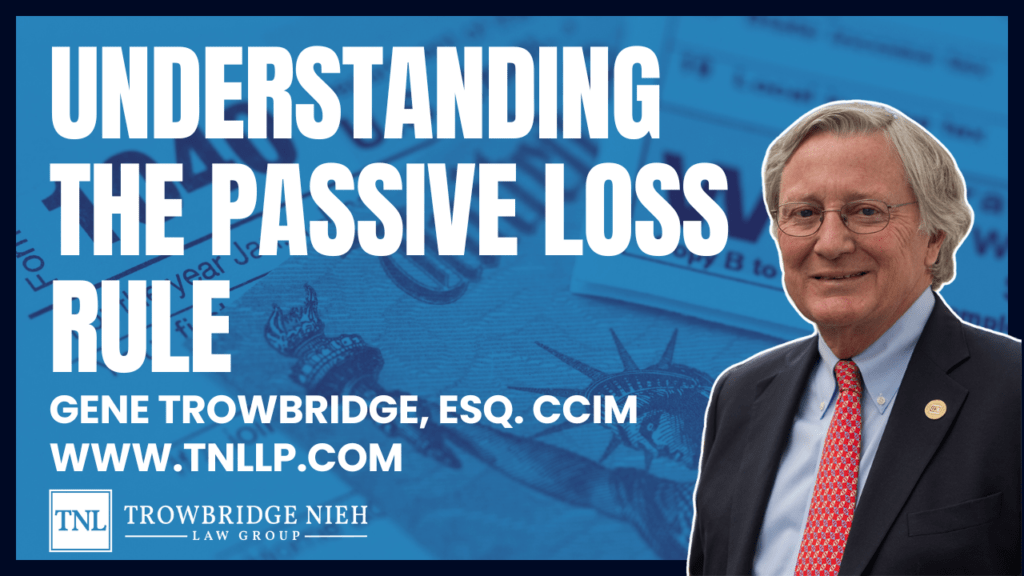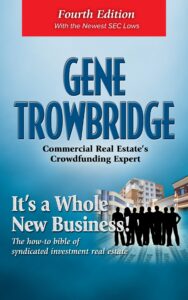Duties, Obligations, and Potential Liabilities for Sponsors
In this episode, securities attorneys Jonathan Nieh and Gene Trowbridge discuss the duties, obligations, and potential liabilities for sponsors.
Transcript
 | JN | Hi, everybody. Welcome back to another episode of TBD with TLG where your host is Jonathan Nieh and my partner, Gene Trowbridge. How are you doing Gene? |
                            | GT | I'm doing fine. How are you today, Jonathan? |
                          | JN | I'm doing great. I'm doing great. |
                            | GT | Good, good, good, good. You notice anything new in the background, Jonathan? |
                          | JN | Oh yeah, you got a nice, cool, what is it? |
                            | GT | Smart board. |
                          | JN | Smart board, yeah. |
                            | GT | I got it, it's called the Vibe smart board. Tim at the office and I have been working on this and we brought this in and it kinda, it's a computer. What it is, it communicates with your computer and I can, this is a PowerPoint slide that's up there right now. I can do PowerPoints. I can do, I can write on there. I can make diagrams and email them to people. |
                            | GT | It's all going to be part of our new education |
                            | GT | We'll figure it out, we'll figure it out. |
                            | GT | So far, I've got this. I've got this so far. |
                          | JN | It looks great. It's great. |
                            | GT | We've got the logo up there. So that's great. So Jonathan. |
                          | JN | Mm hmm. |
                            | GT | Fill me in, what is the topic today? |
                          | JN | So the topic for this week, I know it's TBD. So I guess I'm determining it right now but what we're gonna be talking about today is sponsor, you know, the syndicator, his duties, his obligations to his investors and potential securities law liabilities. Right? And the reason why I want to talk about it is because recently there was a Supreme Court case that came out that, it's kind of controversial, but I guess they limited the SECs ability to go after fraudulent sponsors, to go after their ill gotten gains, right? They limited the amount of money that the SEC can go after as far as, you know, the profits that the sponsor made from defrauding investors. I guess before it was, they were kind of allowed to do punitive damages. They were allowed to get a lot more money from, you know, sponsors who were doing fraudulent stuff. So a lot of people were kind of upset, you know, saying that, oh, no, like, you know, now, you know, sponsors can kind of get away with more than they were before. But I mean, when you think about it, you know, that's just one aspect of a sponsor's liability to their investors, right? It's not just the SEC's ability to go after disgorgement. They also have rescission and there's also the criminal aspect of it too. Right? There's the securities law, there's the criminal law. So you could be prosecuted in a criminal proceeding, but I guess |
                          | GT | I can tell you we didn't rehearse this because it's TBD but I can tell you when the time is right. I'll tell you this story of a guy in LA who did something that was totally against the rules and how it, how disgorgement and prison and everything worked for him. And all you're going to see after I tell you the story is, that guy was dumb. Okay. So don't, don't do that. Well, okay. Let's get started. You know, when you're going to talk about the liabilities that a sponsor has, there's a couple of ways you can figure out what that is. One of the things is you can read my book. My book on page nine through ten talks about the duties that the sponsor has. And Jonathan don't we also enumerate these duties in the PPM? |
                          | JN | It's in the PPM and the operating agreement as well. But should we also point out that if someone wants a free copy of the book they should subscribe to our YouTube channel, right Gene? |
                            | GT | That's right. Subscribe to the YouTube channel, and I'll put a free copy in the book, of the book, in the mail to you. It doesn't help if in fact, I don't know where to send it. So I'm not so up on what happens when you subscribe. But somehow you got to, you've got to let me know where to send it. Okay, I'll let you and Tim work on it, work on that one, okay? |
                            | GT | Luckily, we got a team that could reach out to you, to our subscribers to figure out how to send the free book to you guys. |
                          | JN | Oh, okay. Let's do that. |
                            | GT | We'll figure it out. |
                            | GT | Yeah, this is, this is great. So, there are a number of them and I'll just cover... I'll cover, then you can cover, and we'll go back and forth. But overall, the issue is you have a fiduciary duty to the investors, not just an agency duty, you have a fiduciary duty because you're taking the investors money. You're in charge of the investor's money. So, broadly a fiduciary duty means that you're supposed to use your best efforts when working on behalf of your client. You're not supposed to work in any way that's adverse to your client's interest. Not necessarily, you're not supposed to work in your own interest instead of your client's interests which you'll hear about my story in a minute. And you're committing to use all of your exercise, to use all of your skills in whatever you said to your clients you were going to do for them in the practice of your business. Now, when we... |
                          | JN | When you say clients I think you really mean investors Right? |
                          | GT | The investors. Okay. Yeah, that's right. |
                          | JN | Cause we have clients. |
                            | GT | We have clients. We do? |
                          | JN | Yeah, I'd hope so. |
                            | GT | We have one this month, right? So anyhow, when we're doing our full day training, Jonathan, you and I always talk about the fact that we compare agency duty with fiduciary duty. And we do that because so many of our people are in the real estate business and have real estate licenses and have agency duty. When you sign a listing agreement or selling contract or property management agreement, you have an agency duty and that's contractual and sure, that's laid out in what the state law is but when you actually take people's money it moves over into the fiduciary area. And fiduciary starts with F and fraud starts with F so they kind of got you coming and going both ways. So that's my opening salvo about fiduciary duty. What else, Jonathan? |
                            | GT | So, I mean, you normally see it in like a corporation setting. That's when I first learned about fiduciary duties is when I took business entities in law school, you know talked about corporations and directors of the corporation have a fiduciary duty to the shareholders. It's very similar to when you're doing a syndication, the LLC, the manager has the fiduciary duties to the members of the LLC, or if you're doing a partnership, right, the general partner has fiduciary duties to the limited partners. And it's only that direction, right? It doesn't go the other direction. Limited partners don't have any duties to the general partner. Your investors don't have duties to the sponsor. It's only, you know, it's burdensome on the sponsor only. Right? So should we... |
                            | GT | Okay. So we're talking about the duties that the sponsor has. One of the duties I enumerate in the book is the duty of care. It says here that group sponsors are required to perform their duties with the care, skill, diligence and prudence of like persons in like positions. So how are you going to be judged as a sponsor when you're sitting in the witness chair? You're going to be judged based on, are you, did you use the duty of care that other sponsors of syndications like yours would use? So that's kind of broad, right? But that's the standard of care we have with the duty of care. What's another one Jonathan, we spell out in the PPM? |
                          | JN | There's the duty of loyalty. So it's, you know, kind of like your duty to not have conflicts of interests with your investors. Right? So an example I can kind of think of is say you're a sponsor with a business of doing construction, right? And you do syndication. You have a fee |
                            | GT | A premium, right? |
                          | JN | Yeah exactly. You're basically taking money that should have gone to your investors, should have gone to the company and paying it to yourself, putting it in your own pockets. So that would be a violation of the duty of loyalty, right? |
                            | GT | Yep. We, one of the duties of loyalty is to avoid conflict of interest. And one of the things I say is to enter into contracts with the company that benefit you more than the company and not profit from opportunities that are presented to the company. For example, you've got a whole bunch of money sitting in your account. You've been raising money. You're getting ready to break impounds and you go out and look at a property and you like the property. And you say, you know instead of the company buying that property, maybe I'll write an offer. And the seller asks you to prove up funds. So you show them the bank account of the syndication. You show them the bank account of your offering and say, well, I have $2 million in the bank. Well, first of all, that's fraud on the seller cause it's not your money. But if in fact you were to go ahead and buy that property for yourself using that type of a presentation that would be a breach of the duty of loyalty. And don't we have a section in the PPM where we go through the conflicts? Cause there's always conflicts. |
                          | JN | Yeah. |
                          | JN | You just have to tell people, hey, I'm a real estate broker. I'm out looking at properties all the time. We may buy a property that I look at or I may broker it to another person that's a client. Hey, I'm a property manager. I have 10 properties that I manage. When an opening comes up on one of the properties I'm managing that the syndication owns, I'm going to show people that property. They may lease a different property. You know, that's going to happen. At this time one of the interesting issues is the conflict. You know, I've got a lot of syndications out there. I've got 10 deals I've done. And if we're short of money in any one deal, I don't have to come up with the money. If I do want to come up with the money I can come up with the money and help one deal and not help the other deal. So those are all conflicts that, can you think of anything else we write on conflicts? |
                            | GT | There was one that came up recently. They were talking about, you know, the manager or the people within the manager, being able to I guess go out and find other properties, do other syndications that weren't related to the current syndication that you're doing. I mean, that could potentially be a conflict of interest but I mean, as long as it's not detrimentally affecting your investors, that should be fine. Right? |
                          | JN | So if you had a property management company and you told all the investors and all your syndications that that property management company was going to manage your deals, and then you went out and did some for hire fee |
                            | GT | Fraud. |
                          | JN | Fraud, all the way. And that's, and that's the criminal one. |
                            | GT | Right? |
                          | JN | What about if there's a material change to the offering, I guess. There's a duty to update your investors too. Right? |
                            | GT | Right. At all times, I would think. |
                          | JN | Certainly during the offering period and if you're smart during the period that you're operating the property, you should make changes. Okay. So we've gone through these duties and these are pretty standard. One of the other duties that I think we used to have in our operating agreement, and I'm not sure we do anymore is the prudent businessman rule. Are you running the business the way a prudent businessman would? And that kind of goes back to the duty of care. |
                            | GT | Like persons in a like situation. Cause that's how you're going to be judged. Well, tell us about this case, Jon. |
                          | JN | The recent Supreme Court case? |
                            | GT | Yes. |
                          | JN | So I don't, I don't really remember the facts of what happened, but the holding of the Supreme Court was basically that disgorgement, so one of the, the remedies that the SEC could use to go after, you know, a sponsor who committed fraud is disgorgement which is going after all of their ill gotten gains. So whatever money that they made from defrauding investors the SEC could take that back. The Supreme Court limited that to net profits. Right? So I guess before the SEC was able to go beyond net profits to get more from the sponsor than just what, you know, they're able to show was profit made from that transaction. So, I mean, yeah, there is, you know, it does kind of seem like it's limiting the SEC's ability to go after fraudulent sponsors but you know, there's other ways that the SEC can go after them. Right? So there's the concept of rescission which is forcing the sponsor to return all of the investor's funds that they accepted. Right? So when does that usually come up Gene? Cause I haven't really seen anyone. |
                            | GT | Oh, the rescission. Well the rescission would come up if, well, are you ready for a story? |
                          | JN | Yeah. That's what I was getting at. I wanna hear it. |
                            | GT | I'll tell you a story about it. Jon the syndicator. Which is a good name, it wasn't his name but Jon the syndicator was raising money in a blind pool to buy small apartment buildings. And as he was raising money to buy apartment buildings with, he had amassed quite a bit of money in the fund and hadn't bought anything yet. And he found a nightclub that was for sale. He took the money out of the fund, bought the nightclub in his name. Six months later after doing renovation and whatever, he sold the nightclub and made a fortune, which is subjective but made quite a bit of money and put the initial investment that he had taken back into the fund. So let's say he took $500,000 out of the fund, bought a nightclub, sold it for a million. He put $500,000 back in the fund, which he did. So now the question is the $500,000 profit he made, whose money is that? Well, first of all, it was fraud because he took the, he told the investors what he was going to do with the money. And he did something different. And number two, the issue of disgorgement came out. What are we going to do? He's got that $500,000. And then he's going out with that profit and doing other deals for his own benefit. So in that case, in that case the police came into his office and shut him down, took all of his computer equipment, all of the records, hauled them off and put him in jail. And he served two years as a fraud. And then they went after not only the $500,000 of profit but the profit he made off of that $500,000. They tried to get all of that back. And then the point was they were going to give it to the investors. Well, of course the money is gone, right? So they weren't lucky enough to get all that back. But that was the remedy for the investors, disgorgement of all the profit he made off of that first $500,000 transaction. True story. Interesting. And so what about rescission? Okay. So in an effort to minimize his damages, his criminal and civil damages, he made a rescission offer to all of his investors to give them their money back and the profits. I'll just make you whole and it's over with. Well, unfortunately, a rescission offer has to be made to everyone and you have to be able to perform. He couldn't perform. He couldn't give everyone all their money back and the profits. He gave people, he tried to get around it by trying to give people the chance to stay with him and go forward and some people to get rescission. But the rescission has to be made, the offer has to be made everyone. So it became an ineffective rescission offer and it didn't help him with his remedy at all. So, what we've been talking about here is the duties that a syndicator has based generally on their fiduciary duty to their investors. And that takes you into the duty of care, the duty of disclosure, the duty of loyalty, and the duty to tell people about important things that happen when you're going on. And that's something you need to think about. You know, people say when you and I talk to them, Jonathan, about the risk of being a syndicator, well what risk is there? Well, the risk is you do something wrong. You do something stupid. You're out looking at properties and you find a sweetheart deal and you buy it yourself. And that isn't necessarily wrong. Depending upon how you did it, it might be wrong. So you have to be careful. In my world, I gave up being a real estate broker so I could be a syndicator exclusively. So I didn't have to deal with the conflicts of being a broker and a syndicator. Not everyone does that. And some people I know gave up being syndicators cause they just want to be a broker because they think the conflicts are too much. And some people do both. It works. So that's good. That was a good topic you brought forward today, Jonathan. And let's wrap this up by inviting everyone to join us on Thursday at 12 o'clock California time for the next episode of TBD with TLG hosted by Jonathan and Gene. Join us then. |





